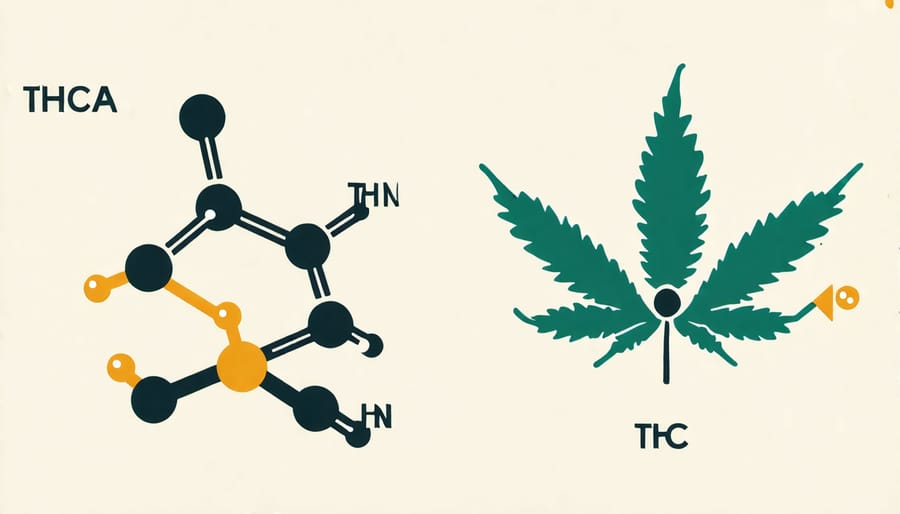Explore the unique properties of THCA gummies by starting with informed purchasing decisions. Understand the distinction between THC and its non-psychoactive counterpart, THCA, known for potential benefits without the high. Learn from expert interviews on why THCA is gaining traction among cannabis enthusiasts. Seek products that guarantee quality and transparency, like those offered by reputable brands such as Budpop Delta 8 thc Gummies. Incorporate these gummies into your wellness routine by following recommended dosages and consulting healthcare professionals. Embrace the progressive side of cannabis culture with informed choices, fostering both health and awareness.
Understanding THCA: What Sets It Apart?
To truly understand the cannabis plant, it’s essential to highlight the differences between THCA and THC. While THC, or tetrahydrocannabinol, is widely known for its psychoactive effects, THCA, or tetrahydrocannabinolic acid, represents a fascinating precursor that’s gaining attention for its unique properties. Found in raw and live cannabis plants, THCA doesn’t induce the “high” typically associated with THC because it is non-psychoactive. This means THCA doesn’t directly bind to the cannabinoid receptors in the same way THC does. Instead, THCA is often admired for potential health benefits without the intoxicating effects.
The journey from THCA to THC is a natural biochemical transition. When raw cannabis is exposed to heat through smoking, vaporizing, or cooking (a process known as decarboxylation), THCA transforms into THC. This conversion plays a crucial role in the different experiences one might seek from cannabis. However, those interested in consuming cannabis without euphoric effects might find THCA an attractive option. Embracing this difference creates opportunities for varied consumption methods like raw cannabis juicing or innovative products like THCA gummies. These gummies allow individuals to explore potential anti-inflammatory and neuroprotective benefits, sparking curiosity among consumers who value wellness without intoxication.
Understanding the distinction between THCA vs. THC can also pave the way for informed conversations about legislation and use within various communities. This opens up pathways for further research into the therapeutic aspects of cannabis and helps in advocating for policies that recognize the full spectrum of what cannabis can offer. Creating awareness and promoting education around THCA is not just about empowering choices in the cannabis culture, but also about enriching the dialogue surrounding its versatile applications, illustrating the plant’s potential beyond recreational use.

The Health Benefits of THCA

Anti-Inflammatory Effects
THCA, the raw form of THC found in cannabis, is gaining attention for its potential anti-inflammatory properties. Enthusiasts and policy makers alike are exploring how THCA gummies, a non-psychoactive option, might offer relief for inflammatory conditions. Research suggests that THCA could play a significant role in treating arthritis and other inflammations by interacting with the body’s endocannabinoid system to regulate immune response. This interaction might help those looking for alternative methods to manage pain and inflammation without the psychoactive effects of THC.
Amy, a long-time cannabis activist, shares her story of discovering the benefits of THCA gummies for her own inflammation issues. She describes how they have become a part of her daily wellness routine, emphasizing how natural solutions like these can destigmatize cannabis. As more studies unfold, the therapeutic implications of THCA become clearer, making it a compelling legal subject in the evolving landscape of cannabis use. For individuals interested in exploring cannabis’s progressive benefits, THCA presents an exciting frontier.
Neuroprotective Qualities
THCA has been gaining attention in the world of cannabis for its potential neuroprotective benefits. While many are familiar with the psychoactive effects of THC, THCA stands out as a non-psychoactive compound, playing a unique role in brain health. Emerging research hints that THCA may help safeguard against neurodegenerative diseases, offering support to the brain’s natural defenses against inflammation and oxidative stress. Such inflammation is often linked to conditions like Alzheimer’s and Parkinson’s, making THCA an intriguing focus for scientists aiming to uncover natural interventions.
Beyond the petri dish, individual stories from those incorporating THCA into their wellness routines highlight its positive impact on mental clarity and focus. Jane, a long-time cannabis advocate, shared how incorporating THCA gummies eased her cognitive fog and enhanced her daily mindfulness practices. As studies continue and public policy evolves, the conversation around THCA’s place in both personal and medical use of cannabis grows, fostering a deeper understanding of this remarkable compound.
Other Therapeutic Uses
THCA gummies offer a versatile option for individuals seeking natural wellness support, harmonizing with modern health routines. Many users find that these gummies help soothe stress, creating a sense of calm and balance amidst daily chaos. This non-psychoactive compound is also recognized for its potential in alleviating nausea, offering relief for those dealing with occasional digestive unease. Stories from the community highlight personal journeys: some have integrated THCA gummies into their wellness regimens to enhance relaxation and support overall well-being. As we continue to explore these benefits, the dialogue around THCA promotes education and destigmatization in cannabis culture.
Why Gummies Are the Preferred Choice
Gummies have skyrocketed in popularity as the go-to method for THCA consumption, and it’s not just because of their colorful, delicious appeal. In a world where convenience is king, gummies offer a discreet and portable option for those who are on-the-go. Unlike traditional methods of consumption, such as smoking or vaping, gummies allow individuals to enjoy the benefits of THCA without drawing attention or requiring additional equipment. This makes them a perfect fit for busy lifestyles and ensures that consuming THCA can seamlessly integrate into everyday routines.
Beyond convenience, gummies are increasingly recognized for their efficacy in absorption. Unlike other edibles that might break down in the digestive tract before the body fully absorbs their active compounds, gummies are designed for sublingual absorption. This means the THCA is absorbed more directly into the bloodstream, potentially offering a quicker and more consistent onset of effects compared to other edible products. This efficient absorption method is important for individuals using THCA for specific health benefits, as it ensures a reliable and steady release of the compound.
Moreover, the precise dosing offered by gummies can be particularly advantageous. Each gummy comes with a designated amount of THCA, taking the guesswork out of dosage and allowing users to tailor their consumption to meet personal needs or preferences. For those keen on exploring the benefits of THCA while contributing to environmentally friendly practices, it’s worth considering the broader impact of the industry, such as the ongoing efforts to mitigate the environmental footprint associated with cannabis cultivation. Overall, gummies provide an appealing blend of convenience, efficacy, and mindful consumption that strongly resonates with today’s informed cannabis consumer.

Navigating the THCA Gummies Market
Dosage Considerations
When determining the right dosage of THCA gummies, it’s essential to consider individual needs and experiences. Starting with a low dose, such as 5-10 mg, can be wise for beginners, allowing them to gauge their body’s response. For those seeking more pronounced benefits, increasing the dosage gradually may be appropriate. However, there’s no one-size-fits-all formula, and factors like body weight, metabolism, and desired effects play critical roles. It’s crucial to prioritize safety and effectiveness by consulting healthcare providers before making adjustments, ensuring that these natural supplements are aligned with one’s health goals and existing medications or treatments.
Quality and Sourcing
When exploring the benefits of THCA gummies, it’s crucial to focus on quality and sourcing to ensure a safe and effective experience. High-quality THCA gummies should be made from organically sourced cannabis, as it promotes environmentally conscious practices and aligns with sustainable cannabis consumption. Additionally, look for products that have undergone third-party lab testing. This guarantees the absence of harmful contaminants and verifies the THCA content, ensuring you get what you pay for. Opting for transparent brands that share their sourcing and testing processes not only supports ethical business practices but also helps destigmatize cannabis usage by prioritizing consumer safety.
Legal and Ethical Considerations
Navigating the legal landscape for THCA products can be complex, as it varies significantly across regions. In areas where cannabis is legalized, THCA gummies generally fall under the same regulatory umbrellas as other cannabis products. However, shifting legislation can cause gray areas. It’s crucial for consumers to stay informed about local laws to ensure compliance. Ethically consuming THCA gummies involves understanding their origins and the practices of the producers. Supporting companies that prioritize sustainable and transparent operations enhances the social responsibility aspect. With the right knowledge, enthusiasts can foster a culture of informed and responsible cannabis use amidst evolving policies.
Potential Risks and Considerations
As we explore the world of THCA gummies, it’s essential to consider potential risks and approach consumption responsibly. Though non-psychoactive, THCA is still an active compound in cannabis, and users should be mindful of dosage to avoid possible unintended effects, such as gastrointestinal discomfort. It’s crucial to start with low doses, especially for those new to cannabis products, and gradually find what suits their body best.
Another consideration is the sourcing and quality of THCA gummies. The cannabis industry is rapidly evolving, and with this growth comes the potential for variances in product quality. Consumers should look for reputable brands that provide third-party lab testing results to ensure the gummies are free of contaminants like pesticides or heavy metals. This practice not only guarantees safety but also assures users that they are getting the advertised potency.
Additionally, keep in mind that while THCA is legal in many areas, variations in legislation can impact its availability. Being informed about local laws can help avoid legal complications and ensure that any use of THCA products is within the bounds of current regulations.
Ultimately, approaching THCA gummies with an informed and cautious mindset can maximize their potential benefits while minimizing risks, fostering a positive experience within the broader cannabis culture.
Conclusion
In conclusion, THCA gummies offer an exciting opportunity for those interested in exploring the potential benefits of cannabis in a convenient and palatable form. As we’ve seen, THCA boasts unique properties that may contribute positively to overall wellness, from anti-inflammatory effects to neuroprotective capabilities. Incorporating THCA gummies into your health regimen could serve as an innovative way to experience the therapeutic possibilities of cannabis while fostering an informed and progressive approach to its use. Remember, it’s essential to integrate these thoughtfully and responsibly, always considering personal health goals and consulting with healthcare professionals when necessary.
